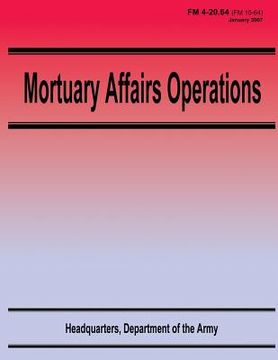Synopsis "Mortuary Affairs Operations (FM 4-20.64) (in English)"
This manual, "Mortuary Affairs Operations," serves as a planning and operations guide for all personnel involved in mortuary affairs (MA) within a theater of operations (TO). These personnel must ensure the MA mission is completed with available personnel and equipment. They must also know the types of problems they may face in performing the MA mission. This manual will assist in determining operational capabilities and limitations and help guide the allocation of resources to successfully complete the mission. This manual outlines existing doctrine and relates policy, procedures, and standards. This publication applies to the Active Army (AA), Army National Guard (ARNG)/Army National Guard of the United States, and United States Army Reserve (USAR) unless otherwise stated. It is designed for use as a guide to operations and procedures by commanders, supervisors, and planners. The use of Automated Information Systems (AIS) that are used to execute business functions is common throughout the sustainment mission area. The specific automation requirements and functional software applications that will support MA operations for the total Army are under development. Automated systems include the Global Combat Support System (GCSS), Force XXI Battle Command Brigade and Below (FBCB2), Movement Tracking System (MTS), Battle Command Sustainment Support System (BCS3), the Defense Casualty Information Processing System (DCIPS), and other related AISs at all force levels. These automated systems will provide the automated means to fulfill the MA requirements given in this manual. This manual is a doctrinal guide to MA operations within an area of operations (AO) within a Joint TO. As such, it gives the mission and organization of the MA force structure. The manual also explains the role of the various levels of command in the TO. Command relationships between the different brigade combat teams (BCTs), the division, the corps, and the theater are current as of the publication date of this manual. This manual should be used in conjunction with JP 4-06 and AR 638-2. The Armed Forces are charged with defending the nation and its people. This extends to safeguarding the natural environment. Former Chief of Staff General Dennis Reimer has stated "Environment responsibility involves all of us." The environmental ethic must be part of how Soldiers live and train. By working together, the Armed Forces can forge a premiere environmental stewardship program. Protection of the environment, while providing tough, realistic training, is the key to ensuring the Army is trained and ready to fight present and future enemies. All leaders are expected to serve as the Army's environmental stewards and have a personal and professional responsibility to understand and support the Army's environmental program. Violations of environmental laws and regulations can lead to civil and criminal liability, as well as liability under the Uniform Code of Military Justice (UCMJ). Leaders should ensure that unit personnel are properly trained and equipped to achieve environmental legal compliance. Special consideration should be given to storing, handling, and transporting hazardous materials and wastes that are inherent to the MA mission. Pollution prevention techniques should be followed wherever possible. Such methods are preferred because they cost less than environmental cleanup and prevent adverse public opinion. he references section of this publication.

